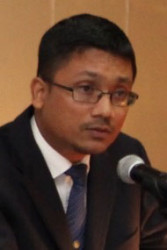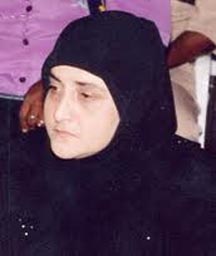Requests for the appointment of a special prosecutor in the magistrate’s courts where there is no cost to the state should be automatically granted by the DPP’s Chambers, according to attorney at law, Gino Persaud.

Persaud strongly believes that if the virtual complainant is confident that there is sufficient evidence to prove their case beyond reasonable doubt and given that such a private arrangement would cost the state nothing, then the Director of Public Prosecutions (DPP) should have no issue with the appointment of a special prosecutor.
“I see nothing unreasonable or unusual with the appointment of special prosecutors since police prosecutors, who are not legally trained, are usually inexperienced, ill-equipped and not competent enough to prosecute serious offences especially white collar crime,” he told Stabroek News.
Persaud was responding to questions from this newspaper on the manner of appointment of special prosecutors. He had been one of two lawyers in 2008 who the Roman Catholic Church sought to have jointly prosecute a fraud case surrounding the Sacred Heart Church which was destroyed in a fire. The request to the DPP was never granted. Persaud has since served as a special prosecutor in other cases.
A special prosecutor was recently appointed in a fraud case in which city businessman Nazar Mohamed alleged that an employee, Eon Ferreira misappropriated some $120 million, money which was given to him to purchase gold. The alleged offence was committed sometime between June 22 and 28, at Bartica and Ferreira made his first court appearance on July 1. Special prosecutor attorney Latchmie Rahamat was on hand to prosecute the matter from the first hearing.
Over the years, concerns have been raised about the greenlighting of only some applications for special prosecutors.

Swift appointments have been made in several high-profile cases inclusive of the Mark Benschop treason trial; the Yohance Douglas murder trial; the New Building Society fraud case; the Buddy’s fuel trial; the Guyana Revenue Authority and Fidelity Investment Limited polar beer scam case and the Oliver Hinckson sedition/terrorism case.
Police officers have undergone special prosecutors’ training but it may be a case that virtual complainants do not consider them capable enough because they are not attorneys at law.
Persaud said that any virtual complainant enjoys the freedom to write to the DPP requesting that a special prosecutor be appointed, at no expense to the state, “if there is no confidence in the police to prosecute.” Persaud said the DPP can agree and subsequently give consent in writing or can order a state prosecutor to take over from the police; however, state prosecutors are rarely sent to the Magistrate’s Court.
This newspaper understands that prosecutions at the level of the lower court are routinely handled by police ranks from the level of Corporal and up.
DPP Shalimar Ali-Hack in response to queries from this newspaper as to the process and the basis on what such appointments are made, made it clear that these lawyers are retained/paid by the virtual complainant and their families, but since the DPP is the sole person vested with the responsibility for all criminal prosecutions, “the DPP must give the permission for the requested lawyer to appear for the prosecution in the matters.”
Stabroek News pointed out that there are observations that appointments are being made in certain cases and that this is a signal that her office has no confidence in the police or state prosecutors being successful. Her response through the chambers’ public relations officer was that “the observations as mentioned have no basis for the simple reason… that it is the virtual complainant and their families who would submit a written request to the DPP requesting that approval for a lawyer to act on their behalf.”
Serious
Persaud told this newspaper that the decision to prosecute is a serious one and a special prosecutor should not simply accept a brief but is under a legal duty to review and advise where the decision to prosecute has been made.
He said that in accepting such an appointment, the attorney has a legal duty to act fairly. “He has to examine the sufficiency of evidence, exercise objectivity and fairness, rely on relevant and admissible evidence and satisfy himself that the evidence can prove the offence beyond reasonable doubt which is a high standard of proof,” he said while adding that the reliability of evidence and the reliability of prosecution witnesses also has to be considered in the taking up of such an appointment.
“A special prosecutor must also consider the public interest and the interest of justice,” he stressed.
He noted that the DPP’s Chambers does not usually send its state prosecutors to the Magistrate’s Courts to prosecute but rather they are usually reserved for the criminal assizes in the High Court.
The attorney singled out the infamous case involving the three senior officers of the New Building Society (NBS) in which a special prosecutor had been appointed. He noted that subsequently the Ombudsman retired Justice Winston Moore found that the men suffered a “grave injustice.” Justice Moore in his report had concluded that there was insufficient evidence to suggest that the trio was guilty let alone to successfully prosecute them.
Persaud went on to explain that he has successfully prosecuted several cases on behalf of the Guyana Revenue Authority and the Guyana Energy Agency in the capacity of Special Prosecutor and he has also declined to prosecute in cases where, “I reviewed the evidence and drew the conclusion that there was either no evidence or insufficient evidence to prove the case beyond reasonable doubt. Nothing is wrong with that. It is the professional and ethical thing to do as a minister of justice.”
In 2008, Persaud along with attorney Nigel Hughes had applied to the DPP to be appointed prosecutors in the US$2 million insurance scam involving the Sacred Heart Church.
He explained that Bishop Francis Alleyne of the Catholic Church wrote to the DPP more than once requesting that he and Hughes be appointed at no cost to the State. “He was never afforded the courtesy of a response. We were prepared to do the matter pro bono. It is public knowledge that the DPP refused to consider the request and allowed the police to continue the case,” he said.
Though not being appointed to prosecute, Persaud and Hughes attended many of the hearings on behalf of the church but were nothing more than observers. The church had grave concerns over how the case was being handled. The case eventually collapsed under police prosecution after a drawn out process and lengthy delays.
Asked whether he thinks the DPP ought to consider the nature of the matter before granting approval, Persaud responded in the negative while again reiterating that it is a known fact that police are not competent enough to prosecute serious charges including charges such as serious fraud and causing death by dangerous driving.
“If the virtual complainant wishes a special prosecutor and requests this at no expense to the state then this should be automatically granted. There is no expense to the state. It doesn’t matter to my mind whether its larceny or murder,” he stressed adding that he is currently associated with another lawyer as special prosecutors in the prosecution of persons alleged to have been stealing flour over a period of time from NAMILCO. The company, he noted felt sufficiently strong enough about its losses to retain special prosecutors.





